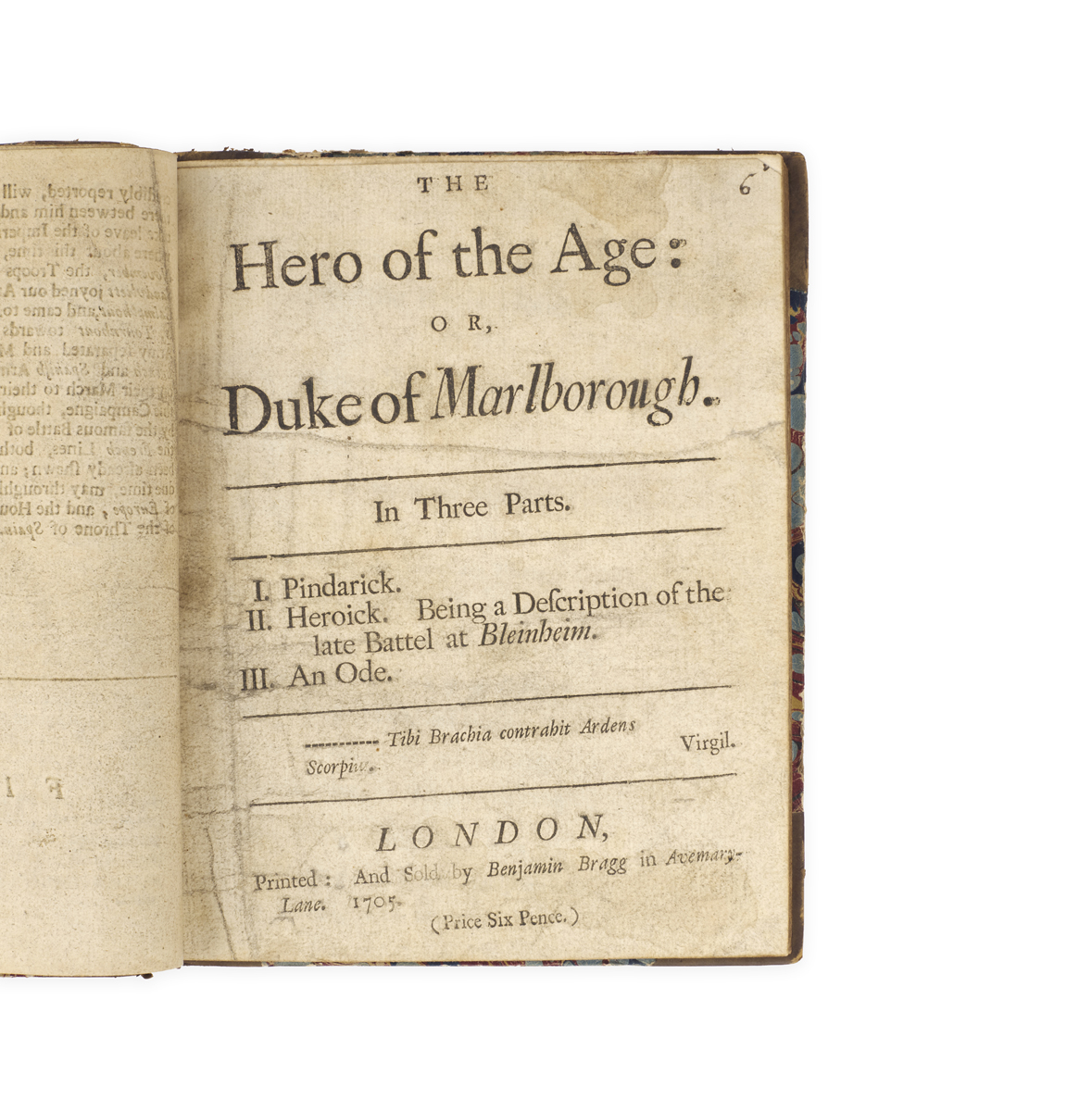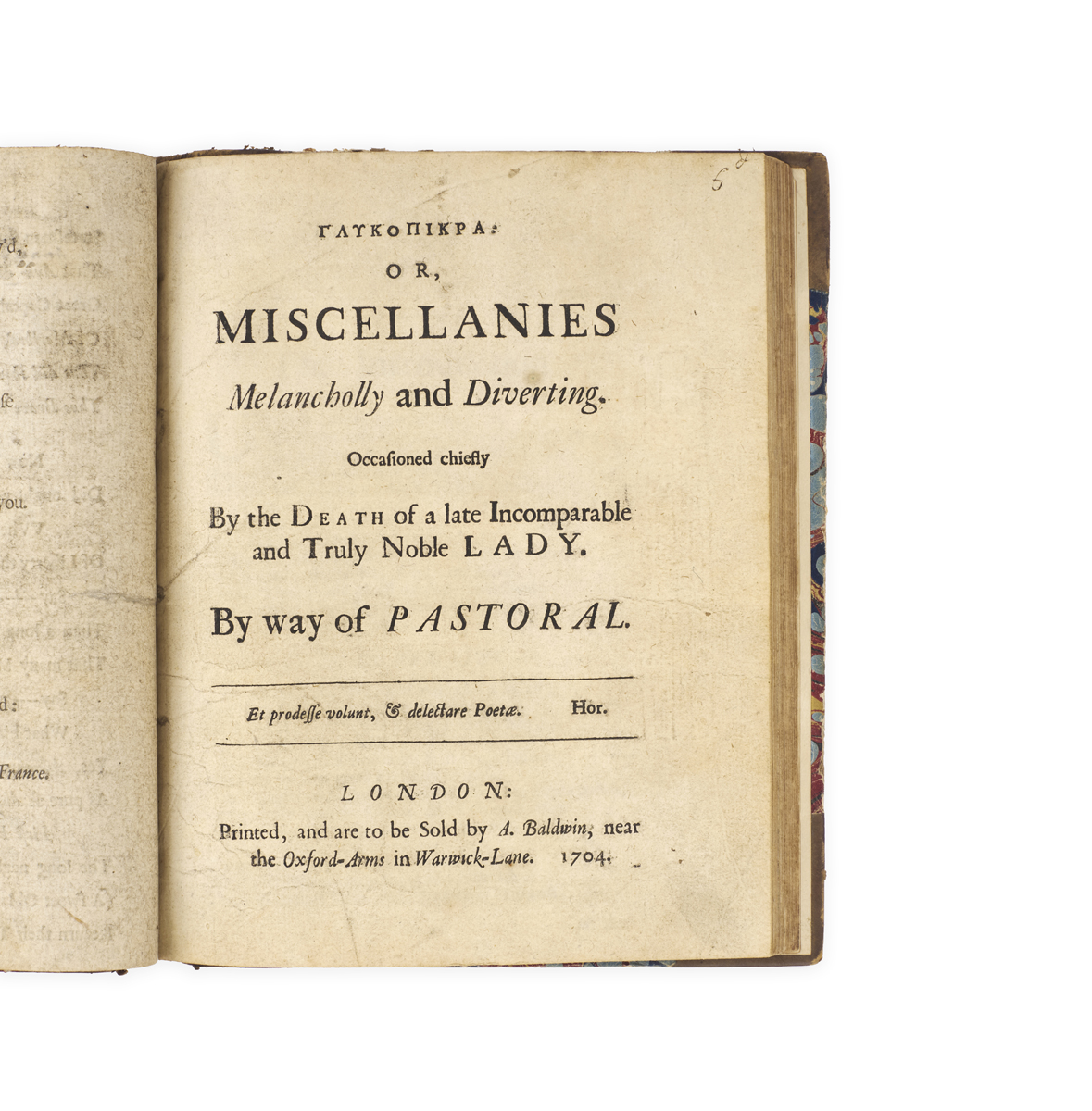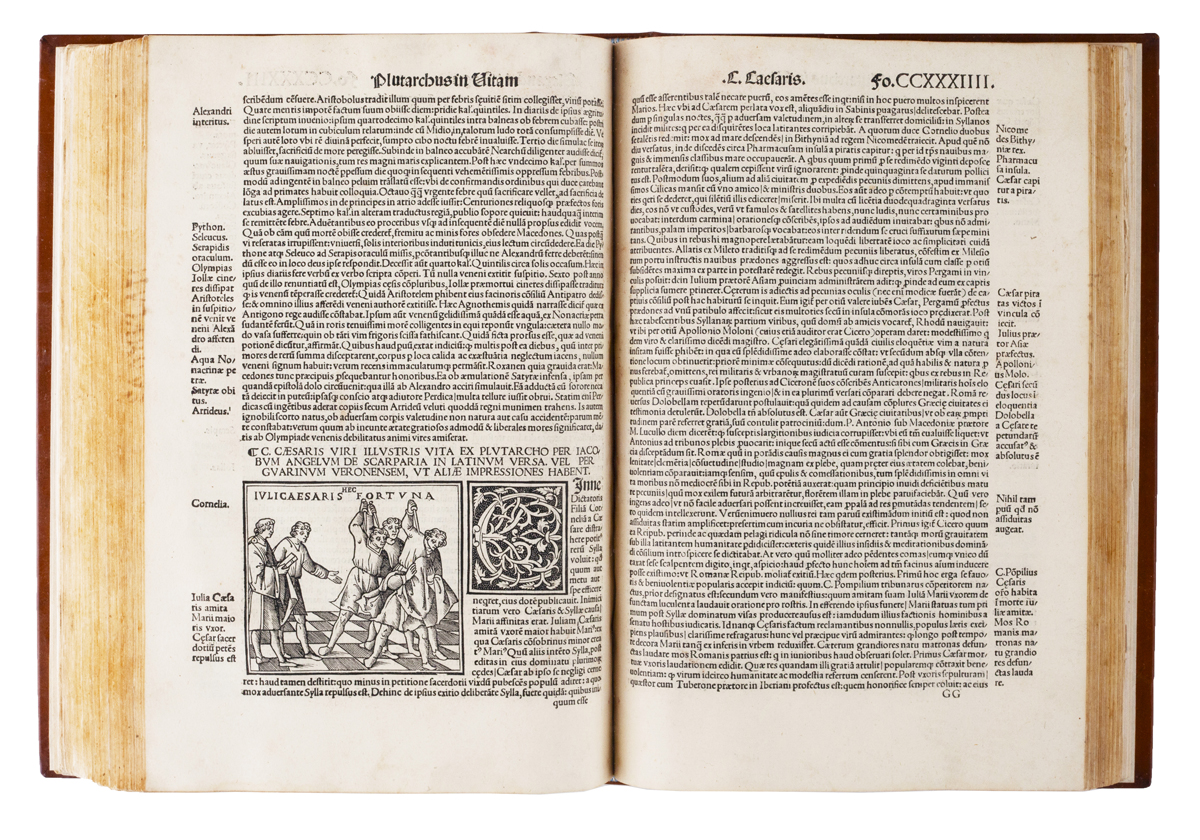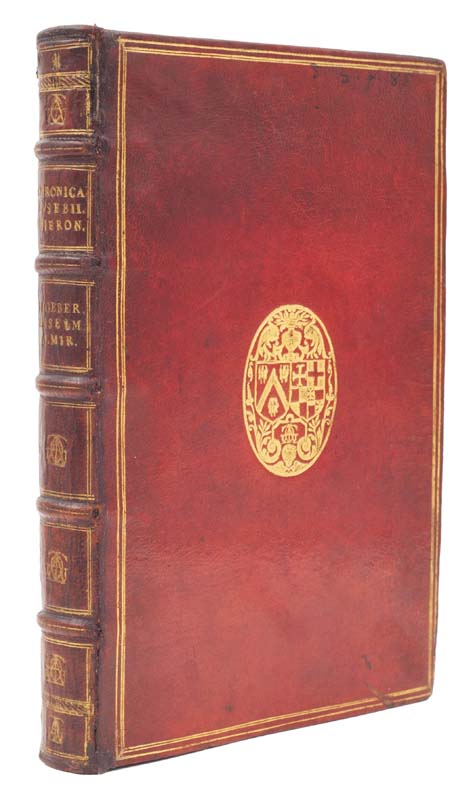

‘WERE SHAKESPEAR LIVING, AND HAD THEN STOOD BY,SHAKESPEAR HAD WANTED WORDS FOR THIS DREAD DAY’
[MARLBOROUGH, John Churchill, Duke of.]
Tract volume of five rare works (three not in the British Library) relating to the Duke of Marlborough and the Battle of Blenheim.
London, 1695–1706.
[ROBINS, Jasper]. The Hero of the Age: or, Duke of Marlborough. In Three parts. I. Pindarick. II. Heroick. Being a Description of the late Battel at Bleinheim. III. An Ode … London, Printed and sold by Benjamin Bragg … 1705.
Pp. [4], 24. Title creased and dusty, one line partly cropped at foot of [¶2]. Not in ESTC.
HISTORY OF THE CAMPAIGNE (The) in Germany and the Netherlands for the Year 1705. Under the Command of his excellency, John Duke of Marlborough … London, Printed for B. Bragg … 1706.
Pp. [4], 55, [1]. Five copies in ESTC: Rylands, Longleat; NLI; Harvard, and Rutgers.
ΓΛΥΚΟΠΙΚΡΑ: or, Miscellanies melancholly and diverting. Occasioned chiefly by the Death of a late incomparable and truly noble Lady. By Way of Pastoral … London: Printed, and are to be sold by A. Baldwin … 1704.
Pp. [2], 30. Six in ESTC: Worcester Oxford, Bodley; Indiana, Newberry, Illinois, Yale.
FEUQUIÈRES, Antoine de Pas, Marquis de. Mareschal Tallard’s Aid-de-Camp: his Account of the Battle of Blenheim. In a letter written by him from Strasburg, to Monsieur de Chamillard … intercepted and sent over to a foreign Minister, residing in England. Wherein some Passages of that memorablle Day, are more fully and impartially related, than in any Relation yet made publick. Both in English and French. London, Printed, and sold by John Nutt … 1704.
Pp. [2], 10, 11, [1]. Title-page dusty and rather pale.
AN EXACT ACCOUNT of the Siege of Namur: with a perfect Diary of the Campagne in Flanders … London, Printed for Tim. Goodwin … 1695.
Pp. [4], 56. Wing E3582A.

Added to your basket:
Tract volume of five rare works (three not in the British Library) relating to the Duke of Marlborough and the Battle of Blenheim.
Five works, 4to, bound together in nineteenth-century half calf with marbled sides; first and last pages of all works dusty; inscription of the sixth Duke of Marlborough dated 1847, bookplate with the Marlborough arms.
The Hero of the Age, published December 1704 by the otherwise unknown Jasper Robins, is one of the rarest literary contributions to the national outpouring that accompanied the martial success of John Churchill, first Duke of Marlborough, in the early years of the eighteenth century. It comprises three poems, in praise of Marlborough’s past victories (e.g. at the Boyne), describing the Battle of Blenheim, and celebrating peace and the reign of Queen Anne. These are prefaced by a dedication to Lady Harriet (i.e. Henrietta) Godolphin, in which Robins hopes the poem’s ‘Incense may be taken well / And by acceptance, yield a grateful smell’, one of the more infelicitous turns of phrase to be found here. Unusual is the reference to an aposiopetic Shakespeare, unable to describe the drowning of the French horse in the Danube. Not listed in ESTC, but known from a single copy in Dr Williams’s Library.
A corresponding French description of Blenheim is to be found in Mareschal Tallard’s Aid-de-Camp: his Account of the Battle of Blenheim; ‘This prose account is marked with much precise detail of the battle, and is innocent of the chauvinism that infects most military accounts’ (Horn). And one of Marlborough’s earlier campaigns is covered in An Exact Account of the Siege of Namur (1695), in which it is reported that ‘Major-General Churchill was detached from His Majesty’s Camp with 8 Battalions to reinforce the Duke of Wirtemberg’, encountering enemy fire – ‘Churchill was shot through the hat’.
The History of the Campaigne … for the Year 1705 is narrated from an engaging birds’-eye perspective – ‘Here we will leave the Baron intrenching himself … and proceed to the Duke of Marlborough’s Army, which we lately left strongly encamp’d at Meldert’. After the resounding successes of 1704, the 1705 campaign was less one to write home about, though a successful action at Elixheim in July broke the French lines and laid the foundation for the victory at Ramillies in 1706. The present History includes correspondence from Marlborough and his Dutch and Imperial counterparts, and lists of the allied forces and of the French and Bavarian combatants killed or taken, and the standards seized.
Though she is nowhere named, Glukopikra is an extended elegy on Anne Dodington (1642–1690), of Breamore House, Hampshire, wife firstly of Robert Greville, Baron Brooke, and secondly of her cousin Thomas Hoby. It takes the form of a pastoral dialogue between Thyrsis and Menalcas, two family retainers. The sprightly and rather entertaining verse is divided into sections praising variously ‘her fair corps’, her kindness to her tenants, her ‘learned discourse’ and knowledge of chemistry, botany, and medicine, her dislike of ‘fops and beaus’, the pleasures of her table (‘Lucullus ne’re had thought himself so rich in / Luxuriant Dishes, had he seen Her Kitchin’), her adoption of a series of tame animals, her anti-Jacobitism, her piety and beneficence, etc. At the end is a more topical section that explains its presence in this volume, ‘On the present State of Affairs’ (Dodington had died some fourteen years earlier): an encomium on Queen Anne and on the Duke of Marlborough.
Horn, Marlborough, a Survey, 59 (Feuquières) and 74 (Robins).

